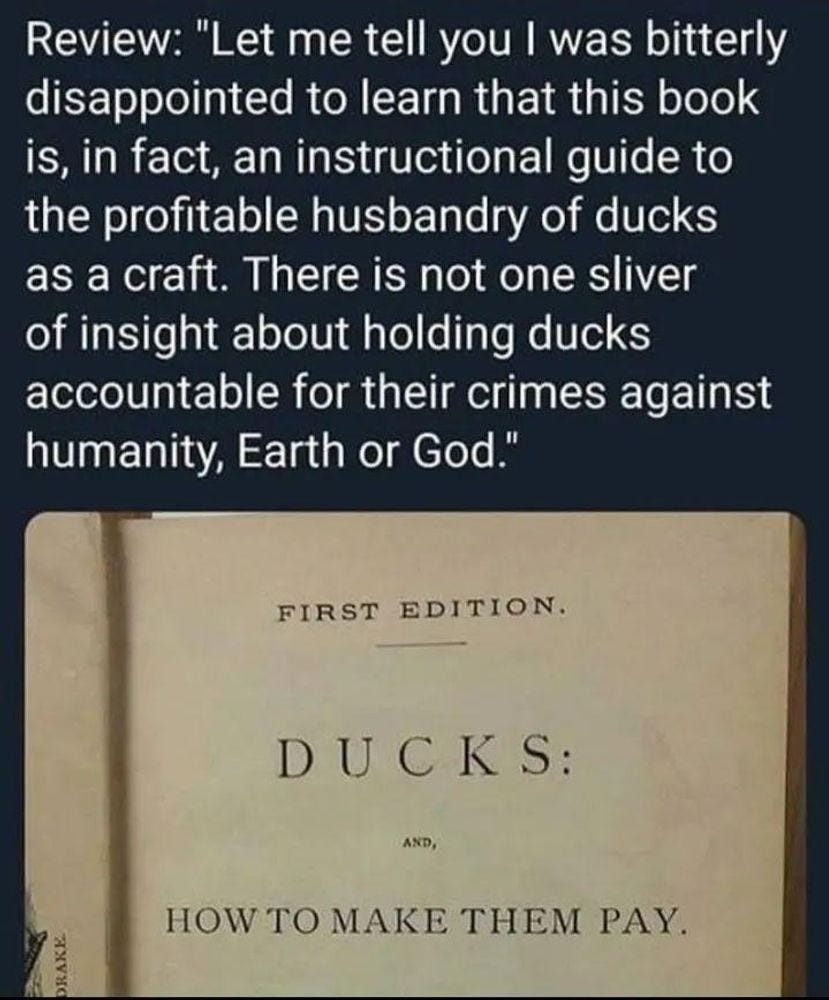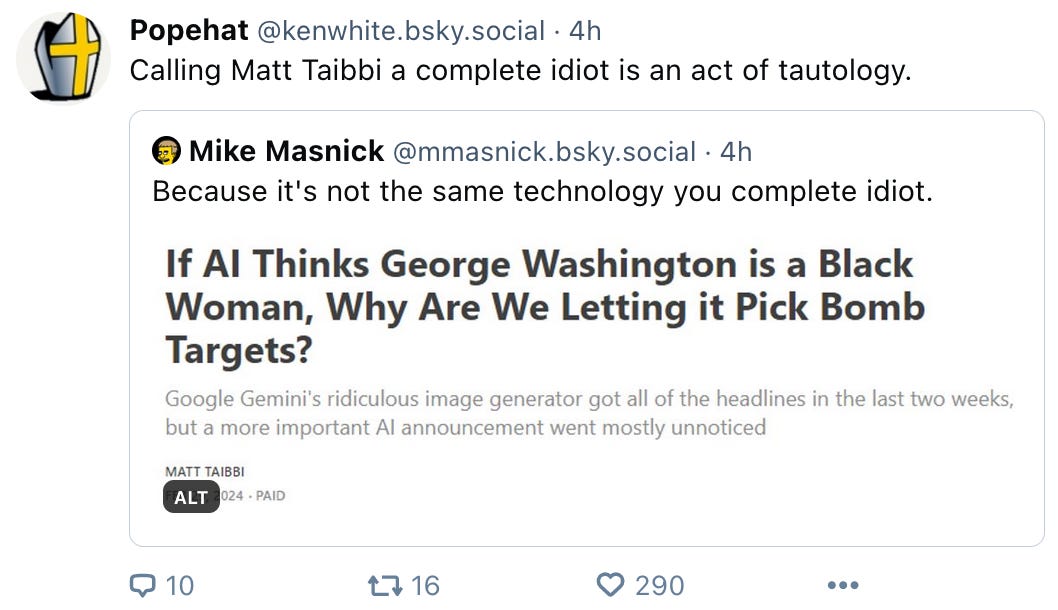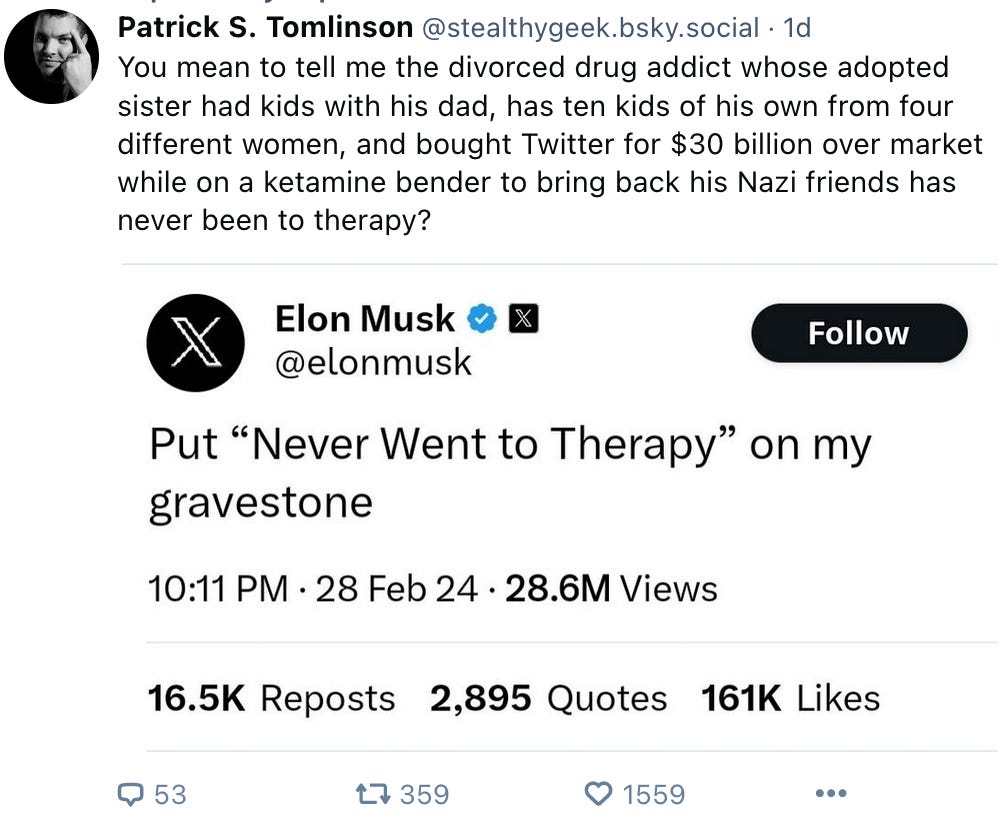TikTok- "Digital Fentanyl?"...or a buncha oldsters fearing what they don't understand, #1
Is not understanding something reason enough to ban it? Asking for several million youngsters...oh, and Donald Trump's corruption figures in, as well
If you watch the news, you know that TikTok is either:
A) going to lead to a communist Chinese takeover of the homeland so that they can destroy our freedoms and everything we hold dear, or
B) a platform to teach young people how to dance and others how to start their own businesses, be their own bosses, and make money independently.
So, it’s either the worst threat to Our Way of Life © EVER…or a wonderful, life-affirming pathway to the American dream (with perhaps a soupçon of Chinese propaganda here and there) that even a man who spent his entire life in an iron lung can monetize.
At the same time, I’m not one to soft-pedal national security concerns. Having grown up during the bad ol’ days of Ronald Reagan scaring Americans shitless because the Russians were coming for us ANY DAY, I understand (even if I disagree with) the abject fear of communism.
I also understand that the American Far Right is rather impotent without an external threat to fear. Whether that “threat” is real, existential, or wholly made up hardly matters. The Russian Bear turned out to be more of a cub during the Cold War, even if Nikita Krushchev somehow managed to convince Americans that the Soviet Union could produce nuclear missiles like sausages.
Yeah, that was a YUUUUGE bluff. When Krushchev told us he had 4000 ICBMs pointed at the US, it turned out that the USSR has all of…wait for it…FOUR. Krushchev felt that the Soviet Union was superior ideologically but inferior militarily. So, he bluffed the US into believing the USSR was a giant, scary nuclear monster with a hair trigger. And we believed every word of it.
Our government took the bait, and so Americans lived in fear of the specter of nuclear war with the Soviets. My parent’s generation grew up with duck and cover drills and all the attendant fear that accompanied a potential nuclear war.
All that time, it turned out the chance of nuclear war happening hovered somewhere just above zero. It was never precisely zero, of course, because, as we’ve found out through the years, there were several fuck-ups on both sides that nearly led to a nuclear exchange, but the risk was never close to what we were led to believe.
I tell this story to add some context to the “controversy” over TikTok, which is owned by a company called ByteDance. Depending on who you believe, ByteDance either is or is not closely affiliated with the communist Chinese government, which (understandably, I suppose) raises all sorts of concerns for national security geeks. After all, it’s their job to worry about such things, and any link with the Chinese government can and probably should be viewed as suspect. The Chinese don’t exactly have our best interests at heart, do they?
This is where the fun begins, though, because those seeking to regulate TikTok, Congresscritters and Senators, are older and many profess profound ignorance of technology, particularly when it comes to social media.
Can we expect Chuck Grassley and Mitch McConnell, both well over 80, to fully grasp social media? Of course not. Yet the Senate will be voting on whether it should be banned in the US after the House passed a bipartisan bill to ban the platform in the US if ByteDance cannot sell it within six months.
Whatever happens with this measure, it marks the first time a chamber of Congress has passed a bill that could shut down a social media platform, a move that civil liberties advocates say tramples on the free speech rights of millions of American users.
TikTok, which is owned by Beijing-based tech giant ByteDance, views the House legislation as an existential threat but not a novel attack, since the social media app has fended off numerous other attempts to put it out of business.
But what, precisely, led the House to pass a bipartisan bill- which NEVER happens these days- that could ban TikTok and potentially put millions of Americans who are making money from it out of business?
Is TikTok “digital fentanyl,” as former Vice President Mike Pence has called it (OK, Grandpa, we know you think that kids could more be more productively spending their time studying their Bibles)? Or is it something positive and beneficial to millions?
Or, Heaven forbid, in our current world nuance-free world, where everything must be black or white, could it be…GASP!!!…both???
Is it possible that Congress and Americans in general might need to take a more nuanced view of TikTok—and all social media—in a world with a pronounced absence of nuance? Might we benefit from assessing social media in terms of net benefits and net negative impacts?
Or is that too damned much work?
The bill gives ByteDance six months to find a buyer for TikTok.
If the company cannot sell the app in that time, it will become illegal for app stores and web-hosting companies to offer TikTok, as long as it remains under the control of a "foreign adversary."
That, in turn, would force Apple and Google to remove TikTok from app stores. It would also require internet service providers to make TikTok inaccessible on internet browsers in the U.S.
There is no way to make TikTok disappear for the 170 million Americans who have already downloaded it. But removing TikTok from app stores would mean that users would not be able to download any further software updates. And experts say without the ability to update regularly, the app would become slow, glitchy, buggy and rife with other problems to the point where using it at all would be just about impossible.
In other words, TikTok would die a slow, gradual death, rather than a swift demise.
The question is whether that registers as a victory and, if so, for whom.
If a trash human being like
, Chaya Raichik, is claiming victory,it’s enough to make me projectile vomit, and
it would also be enough to make me rethink ANY position I was advocating for.
This week is one the most IMPACTFUL weeks in Libs of TikTok history with FIVE stories achieving monumental results with direct action taken because of our reporting.
There aren’t many people I’d say this about…but fuck you and the horse you rode in on. You’re a hateful, miserable excuse for a human being and have nothing positive to add to the public discussion. May you be struck deaf, dumb, and mute.
Yesterday, that is.
But, I digress. Let’s steer the conversation back to someone who’s a reasonable and rational person.
discusses how a TikTok ban lands in terms of election-year politics. The ban and election-year politics are not mutually exclusive.Somewhat contrary to the conventional wisdom, politics is not a zero-sum game. Instead, it’s in the broad family of mixed-motive games where the various players have some interests in common and others that are opposed. Yes, there are a finite number of senators, governors, representatives and presidents. But current legislators also have some shared interests such as in protecting incumbents. And other things being equal, both Democratic and Republican members of Congress would like to promote the interests of the United States — particularly when they feel backed into a corner.
TikTok may be about to learn this lesson the hard way. On Thursday, the House Committee on Energy and Commerce voted 50-0 to advance a bill that would give “China's ByteDance six months to divest from short video app TikTok or face a U.S. ban,” according to Reuters. Under the bill, H.R. 7521, TikTok would qualify as a “foreign adversary controlled application”. China is one of four nations (along with Iran, Russia and North Korea) covered by the term “foreign adversary country’’ — but the bill isn’t even as subtle as that, mentioning TikTok and its parent ByteDance directly.
Of course, China may or may not be a member of the new “Axis of Evil,” but for those pushing this bill, that label certainly doesn’t hurt. If you can make China the “bad guy,” and even racialize the debate the way the War Department did to Japan in WWII, it makes things SO much easier. When your adversary is a concept and not a nation of human beings, it’s easier to dehumanize and attribute malign motives to them.
The White House has signaled its support for the bill, it has plenty of bipartisan and ideologically diverse cosponsors, and Republican House Majority Leader Steve Scalise has said he will bring the bill to the floor for a vote next week. It could get bogged down in the Senate, and will come under court challenges for its First Amendment implications. But it has a lot of momentum, and this post is an effort to explain why.
The committee vote came after TikTok sent a push notification to many of its usersclaiming that “Congress is planning a total ban of TikTok” and urging them to call Congress. This was probably a misstep by ByteDance. One problem is that many of the people who did call Congress were below legal voting age. It’s one thing to have your phone lines jammed by constituents, but another if its teenagers with a rabid TikTok habit.
A second problem is that TikTok’s claim was misleading — one of the bill’s Republican cosponsors even called it “communist China's dangerous propaganda” — since ByteDance would have 180 days to sell TikTok rather than face an immediate ban. If you’re a company that’s facing scrutiny for promoting misinformation, you probably want to be more precise in your high-profile public communications.
Third, there is the psychological factor. Giving rival factions a common enemy can often encourage them to set aside their differences.
Again, it’s easy to demonize the Chinese. If TikTok was owned by, say, the Norwegian Vanilla Soft Serve and Waffle Cone Party, the conversation would be significantly different…if we’d even be having it at all.
Not surprisingly, Republicans are more likely than Democrats to back banning TikTok:
And then there’s Donald Trump’s weird flip-flop on TikTok. In 2020, he unsuccessfully tried to ban the app for much the same reasons Congress is trying to ban it now.
But what would Trump now be throw his support behind TikTok?
Hint: It’s all about the Benjamins
Tommorow: Tune in for Part 2, wherein I explain the (not so very) shocking reason Donald Trump has “fallen back in love” with TikTok. It’s so, so very predictable….
All of my posts are public at this time. Any reader financial support will be greatly appreciated. Currently, there’s no paywall blocking access to my work (except for a few newsletters). That remains an option down the road. I’ll trust my readers to determine if my work is worthy of their financial support and at what level. To those who do offer their support, thank you. It means more than you know.













Whenever I see the meme about Ducks and how to make them pay, it delights me to point out that this is an actual book, and one can find it online at the Internet Archive: https://archive.org/details/cu31924003102971